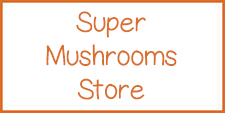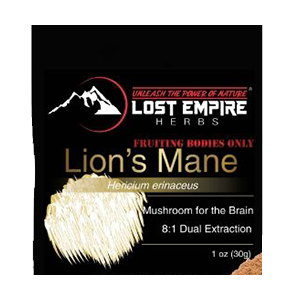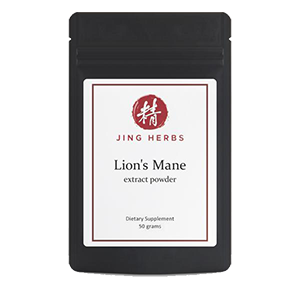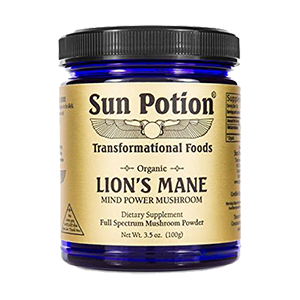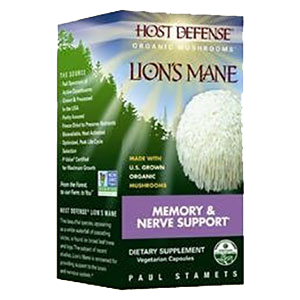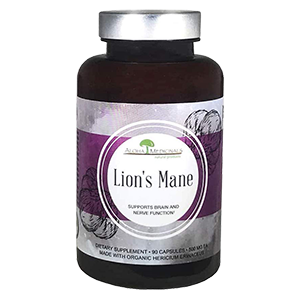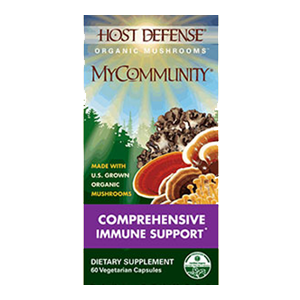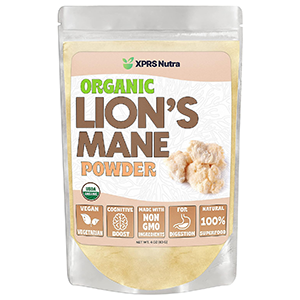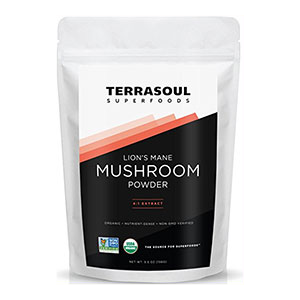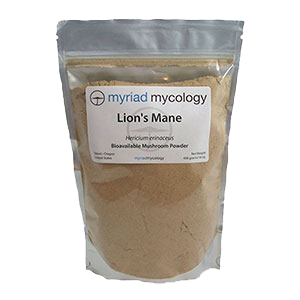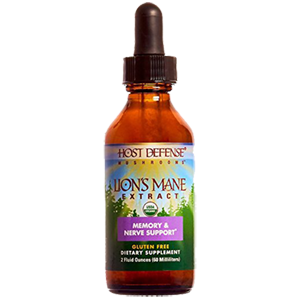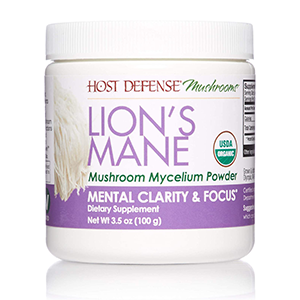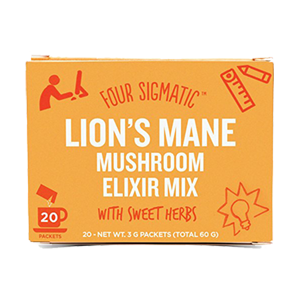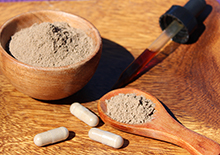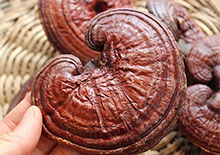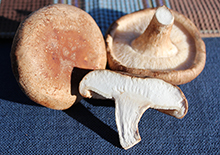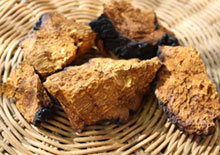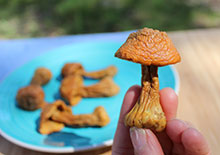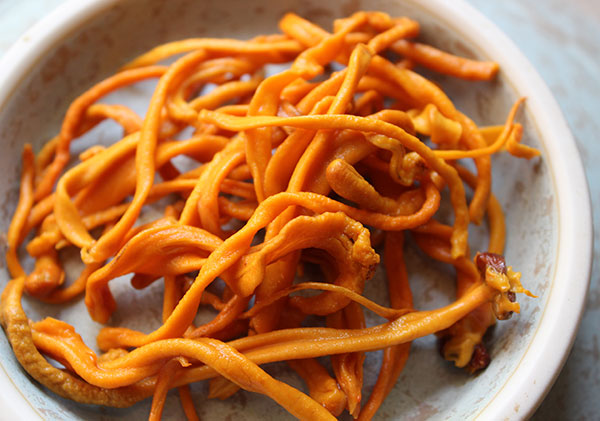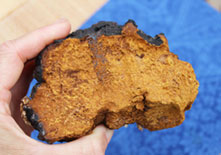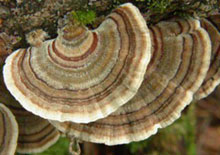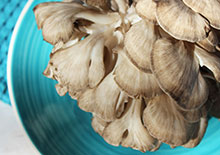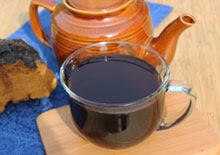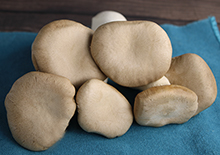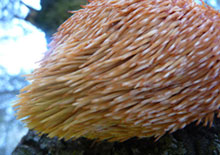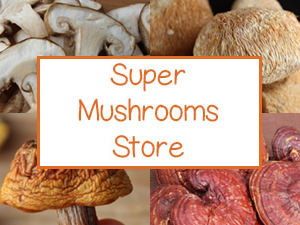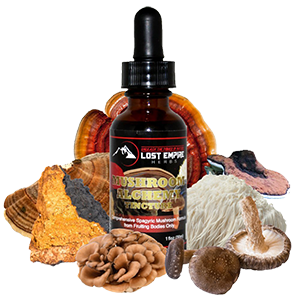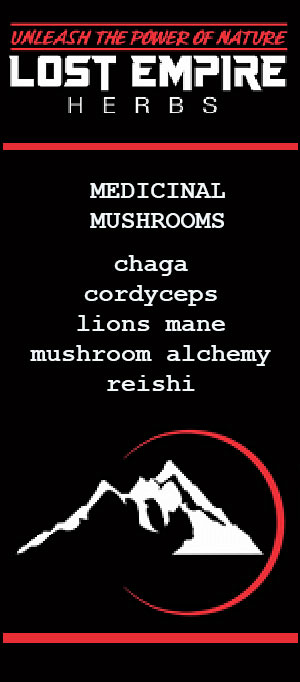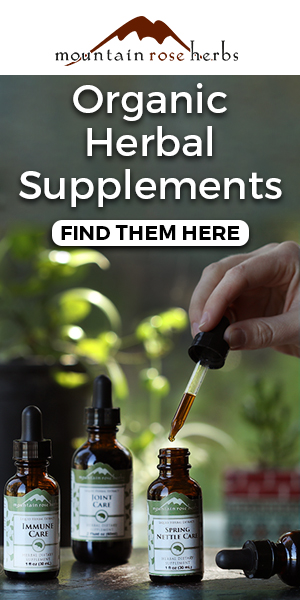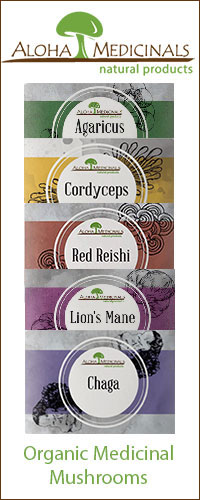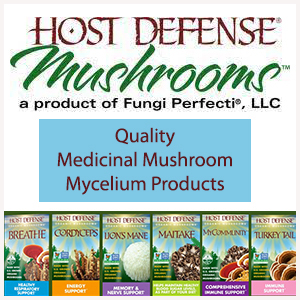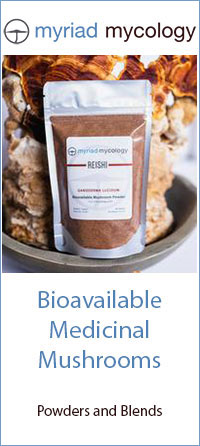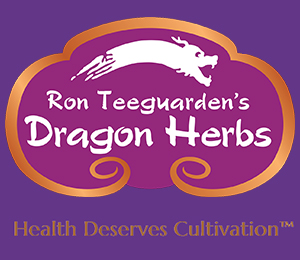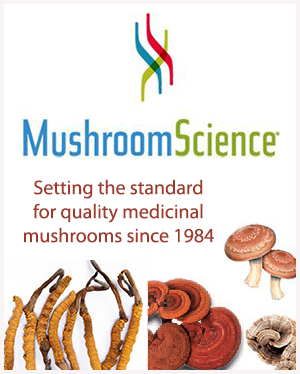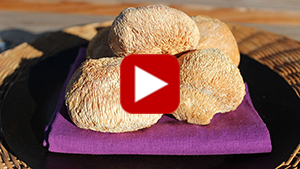- Home
- Super Mushrooms
- Lions Mane Mushroom
Lion's Mane Mushroom, Supportive to Brain and Nerve Functions
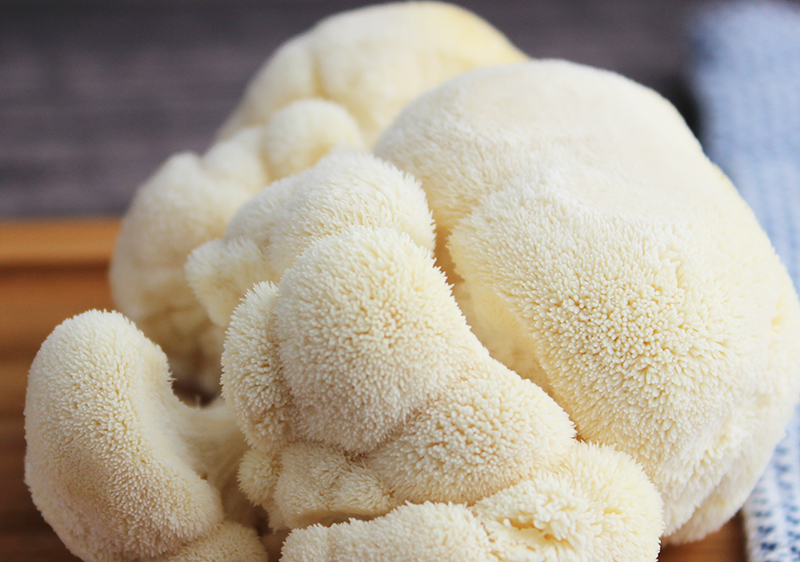
Lion's mane mushroom, Hericium erinaceus, is an immune-enhancing medicinal species that has become particularly well-known in the last several decades for its health-supporting effects on the brain and nervous system.
The subject of much scientific analysis, its specific neuroprotective attributes have been shown to far supersede any other edible variety known today.
Table of Contents
Intro | Brain Boosting Benefits List | Favorite Suppliers | How to Use | Precautions | Shop
Not exactly your typical cap and stem looking mushroom, lion's mane has distinctive white cascading tendrils that, as the name implies, somewhat resemble the mane of a lion. Usually dangling in a single clump on wild hardwood trees, it is indigenous to Eastern Asia, Europe as well as North America.
In Japan, it goes by the name yamabushitake and in China is called hóu tóu gū which translates "monkey head mushroom." Other English names include hedgehog, bearded tooth and pom pom mushroom.
Although lion's mane is a popular culinary gourmet variety when prepared from white fresh or rusty cream-colored dried mushrooms, it is most effective for therapeutic use when consumed as a supplement concentrate, either as an activated water/alcohol extract powder or liquid solution.
These bulk or encapsulated powders and liquid solutions are made from either or both the fruiting body as well as the fungal mycelium, the potent white root-like threads.
Heat treatment or "activation" of
these components is necessary to improve bioavailability and inherent
health-enhancing qualities. This is a type of heat processing that uses
steam or other hot water or alcohol treatments to break down the tough cell walls
that inhibit its complete digestibility.
While lion's mane is also renowned for its beta-glucan immune-modulating properties and benefits to the digestive tract, here on this page we primarily focus on its unique and potent effects as a neurotrophic and nootropic superfood.
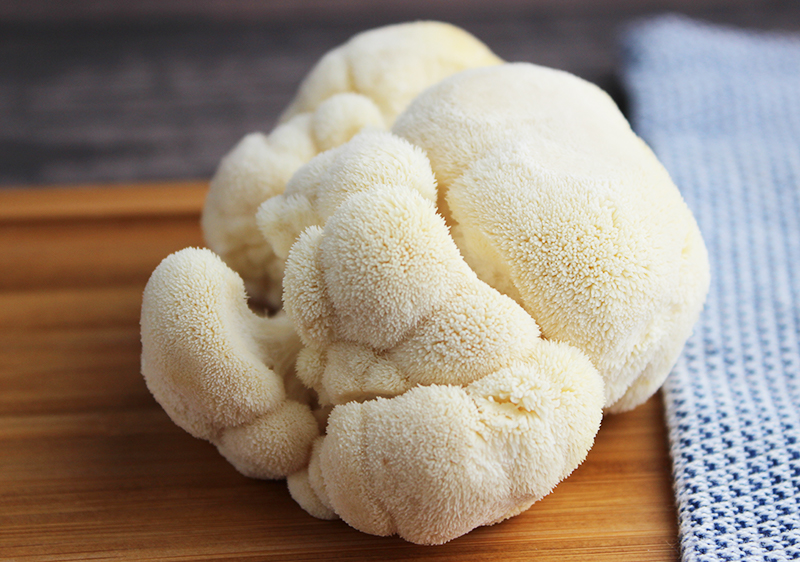
Top Brain Boosting Benefits of Lion's Mane
1) Neurotrophic Properties and Nerve Growth Factor
2) First Studies on Lion's Mane Mushroom and NGF
3) More Lion's Mane Mushroom Research
4) Potential Benefits for Neurodegenerative Diseases
5) Nootropic Mushroom, Memory and Mood Booster
Neurotrophic Properties and Nerve Growth Factor
Lion's mane mushroom is considered one of the best natural dietary supplements you can take for nerve regeneration as it serves as a neurotrophic substance, helping to regulate growth and the proliferation of new neurons or nerve cells.
This is primarily due to a number of constituents, especially the
lion's mane-specific compounds "hericenones" and "erinacines", which
have been demonstrated to stimulate what is referred to as "nerve growth
factor" or NGF.
The stimulation of nerve growth factor promotes the secretion of
small protein neuropeptide molecules that nourish the neurons, inducing
their maintenance, development and survival rate.
Acting as neurotrophins, these components are found to greatly encourage the restoration and performance capabilities of the brain and nervous system.
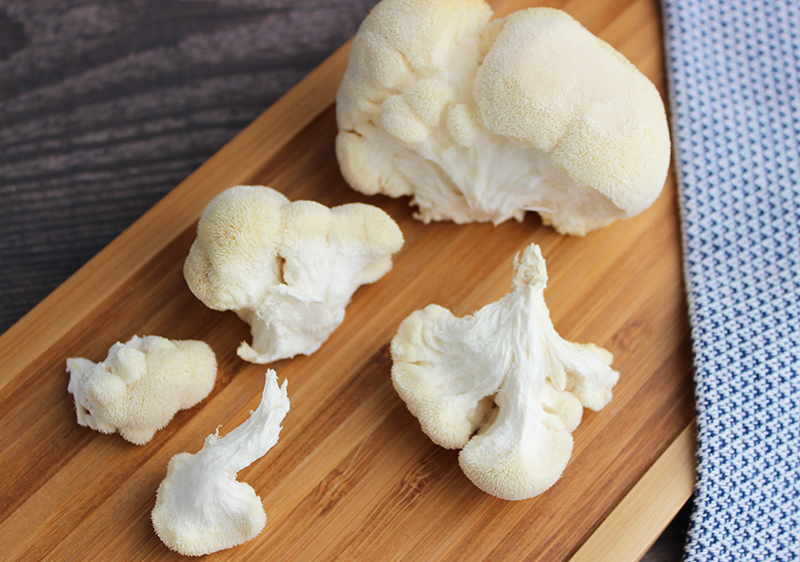
First Studies on Lion's Mane Mushroom and NGF
Lion's mane was first identified in the 1990's, by Japanese researcher Hirokazu Kawagishi, for its ability to improve nerve regeneration by stimulating nerve growth factor synthesis.
The two studies published in 1991 (*) and 1994 (*) show both hericenones C, D and E as well as erinacines A, B and C to be the primary compounds responsible.
Since this time, numerous other studies have been published on Hericium erinaceus species and the mushroom extract's ability to enhance NGF, an effect which is often correlated with a reduced risk of age-related neurodegenerative diseases.
More Lion's Mane Mushroom Research
One earlier study demonstrated that lion's mane extract was the only medicinal mushroom, out of a total of five species, that "promoted NGF mRNA expression in a concentration-dependent manner" in human astrocytoma cells. The mushroom powder was additionally, over a 7-day period, able to produce an increase in NGF mRNA expression in the hippocampus of mice. (*)
In a 2017 study, Hericium erinaceus was again shown to support evidence of its boosting influence on "neuronal functions", primarily impacting the hippocampus region of the brain and stimulating an improvement in learning and memory of wild rats tested.
In other reports, both published in the International Journal of Medicinal Mushrooms, lion's mane extract was identified to induce NGF-synthesis and enhance neurite outgrowth (new neuron projections) (*) as well as regenerate damaged cells from peripheral nerve injury or peripheral neuropathy. (*)
This is a condition that affects the fragile peripheral nerves, located between the brain and spinal cord, that influence the brain's capacity to communicate with the organs and muscles.
This effect was also demonstrated again in the 2016 study documented in the Chinese Journal of Integrative Medicine entitled "Hericium erinaceus, a medicinal mushroom, activates peripheral nerve regeneration."
Potential Benefits for Neurodegenerative Diseases
In the 2008 article published in Drugs of the Future entitled "Compounds for dementia from Hericium erinaceum" by original researcher Hirokazu Kawagishi, it was concluded that:
"Overall, it appears that H. erinaceum may have great potential as a medicine or dietary supplement for dementia, especially AD. However, further studies on its mechanism of action and more extensive clinical trials are clearly needed to substantiate the positive results seen so far." (*)
Other subsequent research continues to confirm the neuroprotective effects and
nerve-growth properties of lion's mane mycelium and fruiting bodies and
their potential usefulness in the prevention of dementia and conditions
such as Parkinson’s (*) and Alzheimer’s disease. (*)
Nootropic Mushroom, Memory and Mood Booster
Out of all the medicinal mushrooms varieties, lion's mane is the top one recommended not only for its positive impact on the nervous system but also for its ability to enhance cerebral performance.
Considered a natural "nootropic" substance, it has been shown to help improve cognitive brain functions, including memory, focus and decision-making.
Lion's mane mushroom and its effectiveness in treating mild
cognitive impairment was tested on a group of human subjects who were given "four 250 mg
tablets containing 96% of yamabushitake dry powder three times a day for
16 weeks." Results revealed, "significantly increased scores on the cognitive
function scale compared with the placebo group." (*)
Another added bonus to taking activated and heat-processed lion's mane concentrates and supplements is that they have been shown to boost one's mood, increasing positive mental states with potential effects at reducing depression and anxiety. (*)
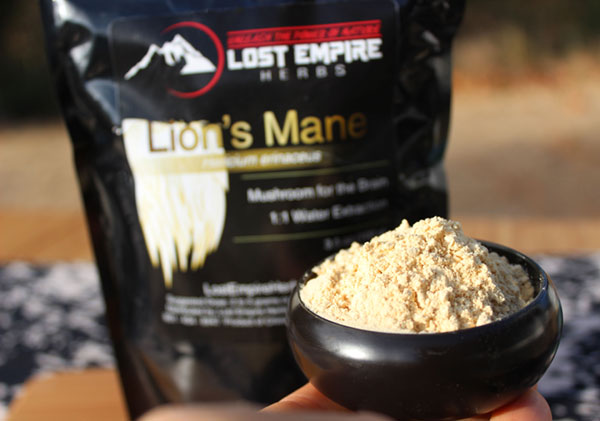
Favorite Organic or Quality Lion's Mane Brands
Lost Empire Herbs - This is a bulk powdered lion’s mane that is a 8:1 dual water/alcohol extract grown using organic methods.
Jing Herbs - Powdered extract of lions mane using a hot water extraction method for greater bioavailablity.
Host Defense - Offer capsules using activated, freeze-dried, certified organic mycelium as well as a liquid extract utilizing both the mycelium and fruiting body. This company is owned by the well-known mycologist Paul Stamets. These products are created from organically grown mushrooms sustainably cultivated on the company's own farm.
Aloha Medicinals - Produces a quality certified organic full-spectrum product. The encapsulated powder is created from a blend of the dried fruiting body, mycelium biomass, primordia and extra-cellular compounds.
Four Sigmatic - This is an "elixir" powder blend of lion's mane, star anise, stevia and peppermint for taste and assimilation. The mushroom is a dual extract made from the log-grown fruiting body. It comes in pre-prepared loose powder packets.
Mushroom Harvest - Provide both bulk powders as well as capsules. They are made from an activated mushroom preparation of mycelium and fruiting body and are certified organic.
Mushroom Science - This is another reputable company producing quality products created from the fruiting body as well as the mycelium biomass. They are an encapsulated hot water extract preparation. This product is made from lion's mane grown on chemical-free wood but is not officially certified organic.
Mushroom Wisdom - This company has been making medicinal mushroom products for over 25 years, producing mushroom hot water extracts made from the fruiting body. They include vitamin C as well for greater absorption. This lion's mane product is not certified organic.
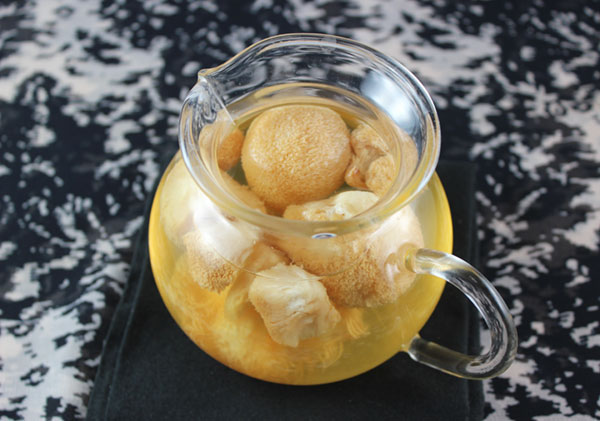
How to Use
For therapeutic use, we personally use a full spectrum product or a
combination of different supplements to consume both the
activated mycelium as well as the water and/or alcohol extracted fruiting body.
The benefits of dietary supplementation with the mushroom is of course best when used in conjunction with a healthy diet and a balanced, but active, daily life.
Keep in mind that you can also grow your own lion's mane mushroom at home from purchased online growing kits. This is a very fun way to experience this beautiful mushroom species.
Bulk activated powdered mycelium and/or fruiting body extracts make a great addition to teas or can be simply added to hot water. Dried mushrooms can similarly be simmered as a tea decoction.
For ritual caffeine drinkers, adding medicinal mushroom powders, like lion's mane, to coffee is becoming another increasingly popular way to consume their benefits.
While fresh lion's mane has a mild seafood-like taste, similar to lobster or shrimp, powders do not have a strong flavor and camouflage well into sweetened drinks and beverages.
Dried mushrooms or powders can likewise be added to soups, stews and grains or creatively incorporated into desserts or recipes. (See our raw chocolate coconut cream pie.)
Lion's Mane Mushroom Dosage
For those seeking to achieve maximum effectiveness from powdered
extracts and concentrated supplements, it is important to remember that
continued regular use is essential. Research has shown that nootropic
properties tend to wear off after a week or two when intake is stopped.
Dosage amounts vary according to specific products and their concentration ratios. It is best to read labels and take the recommended dosage advised.
Precautions:
While medicinal mushrooms are generally considered very safe with long-term use, it is important to seek the advice of your medical physician before taking lion's mane mushroom as a dietary supplement if you have seizures, have been diagnosed with some form of epilepsy, or have a serious health condition.
Shop Related Products (About Affiliates & Amazon Associate Paid Links)
Affiliate Disclaimer: This section contains affiliate product links. If you make a purchase through our recommended links, we receive a small commission at no additional cost to you. Thanks for the support.
